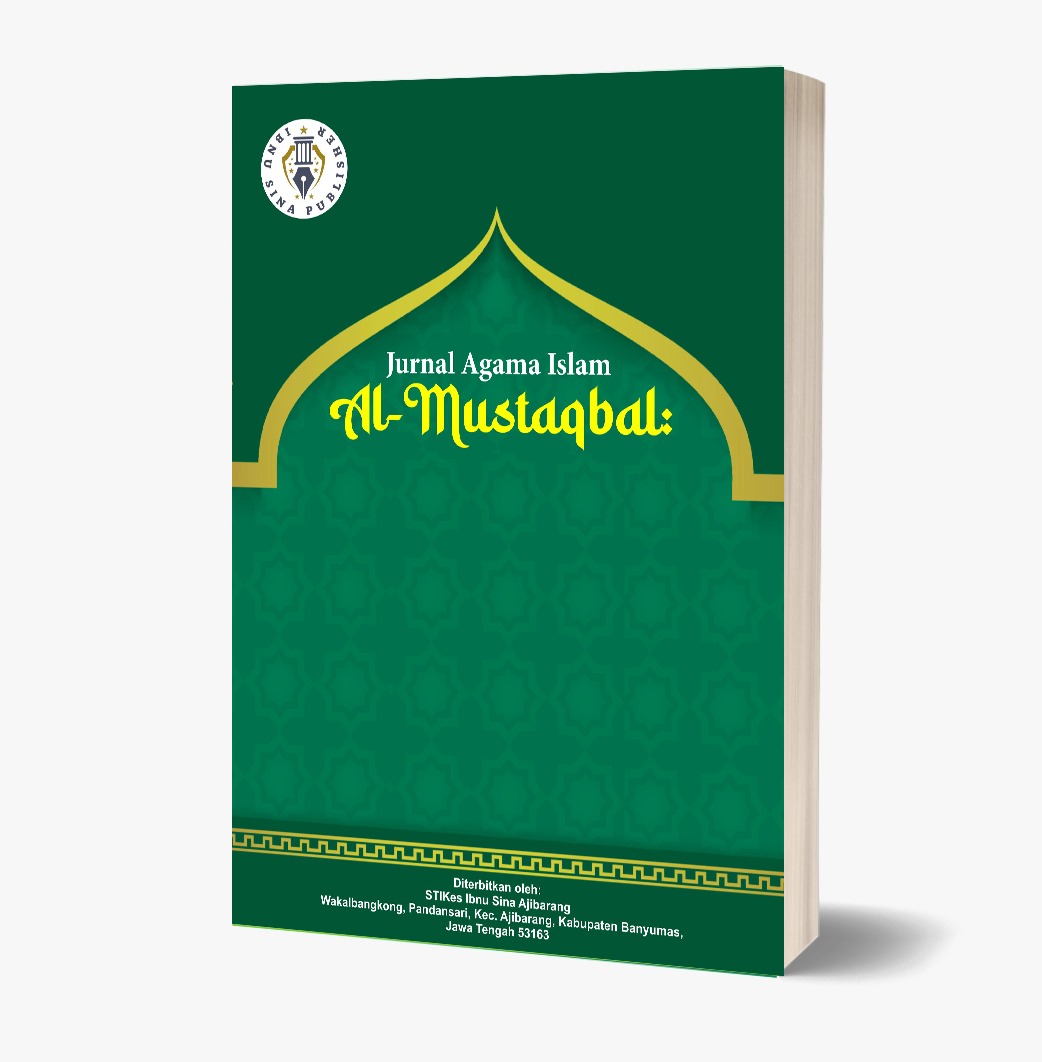Analisis Fenomena Childfree dalam Perspektif Maqāṣid al-Syāri’ah sebagai Landasan Hukum Keluarga Islam di Indonesia
DOI:
https://doi.org/10.59841/al-mustaqbal.v2i3.215Keywords:
Childfree, Maqāṣid Al-Syāri’ah, Islamic Family Law, Reproductive RightsAbstract
This study examines the voluntary choice of remaining childfree from the viewpoint of Maqāṣid al-Syāri’ah to evaluate its compatibility with Islamic family law in Indonesia. Recent demographic trends indicate a rising proportion of adults opting not to have children due to economic, environmental, and personal considerations . Using a doctrinal–normative approach, the paper analyzes primary sources (al-Muwāfaqāt and Qur’ān) alongside contemporary fatwās and scholarly opinions. Findings reveal that while Maqāṣid al-Syāri’ah underscores procreation (ḥifz al-nasl) as a darūriyyah objective, exceptions emerge under medical and sociocultural exigencies (ḥājiyyah), permitting temporary or consensual contraceptive measures. However, permanent sterilization methods (vasektomi/tubektomi) largely remain impermissible except in cases of dire necessity (ḍarūrah) . The study recommends that Islamic legal institutions develop nuanced guidelines balancing reproductive rights with Shariah objectives and societal welfare.
References
Addzaky, K. U., Taufiqurohman, & Asy’ari, M. (2025). Deconstruction of Hifdzun Nasl in Maqasid Syari’ah: Analysis of the Childfree Phenomenon from the Perspective of Islamic Family Law. IN RIGHT: Jurnal Agama Dan Hak Azazi Manusia, 14(1), 11–133. https://doi.org/10.14421/9xrnrr95
Adi, R., & Afandi, A. (2023). Analisis Childfree Choice Dalam Perspektif Ulama’ Klasik dan Ulama’ Kontemporer. TARUNALAW: Journal of Law and Syariah, 1(01), 78–87. https://doi.org/10.54298/tarunalaw.v1i01.73
Arifin, Z., & Mahmudi, Z. (2022). Mandatory Wills for Adultery Children, Analysis of the Compilation of Islamic Law from the Perspective of Maqasid Syariah Al-Syatibi. International Journal of Law and Society (IJLS), 1(1), 36–47. https://doi.org/10.59683/ijls.v1i1.4
Bagus Ary Darmawan, M. Reza Saputra, & Jaenal Aripin. (2024). Analisis Hak Asuh Anak Dalam Putusan Pengadilan Agama Lahat Nomor 685/Pdt.G/2022/PA.LT: Perspektif Maqâsid Al-Syarî’ah Muhammad Thâhir Ibn Âsyûr. Konsensus : Jurnal Ilmu Pertahanan, Hukum Dan Ilmu Komunikasi, 1(4), 319–335. https://doi.org/10.62383/konsensus.v1i4.297
Beck, U. (2001). Interview with Ulrich Beck. Journal of Consumer Culture, 1(2), 261–277. https://doi.org/10.1177/146954050100100209
Blackstone, A. (2014). Childless… or Childfree? Contexts, 13(4), 68–70. https://doi.org/10.1177/1536504214558221
Djawas, M., Misran, M., & Ujong, C. P. (2020). ‘Azl Sebagai Pencegah Kehamilan (Studi Perbandingan Antara Mazhab Hanafi dan Mazhab Syafi’i). El-USRAH: Jurnal Hukum Keluarga, 2(2), 234. https://doi.org/10.22373/ujhk.v2i2.7657
H. Hasyim, Y. S., & Susfita, N. (2023). Tinjauan hukum keluarga Islam tentang fenomena childfree dan pengaruhnya terhadap ketahanan keluarga. Mahkamah : Jurnal Kajian Hukum Islam, 8(1), 54. https://doi.org/10.24235/mahkamah.v8i1.13068
Hanasir, M. N., & Supardin, S. (2020). Penggunaan Kontrasepsi Vasektomi Dalam Pandangan Hukum Islam. Qadauna: Jurnal Ilmiah Mahasiswa Hukum Keluarga Islam, 1(2), 60–71. https://doi.org/10.24252/qadauna.v1i2.12784
Hapsari, I. H., & Srptiani, S. R. (2015). Kebermaknaan Hidup pada Wanita yang Belum Memiliki Anak Tanpa Disengaja (Involuntary Childless). JPPP - Jurnal Penelitian Dan Pengukuran Psikologi, 4(2), 90–100. https://doi.org/10.21009/JPPP.042.07
Harahap, I., Siregar, F. A., & Hariyanto, E. (2025). Understanding The Rise of Childfree Marriage: Avoiding Toxic Family, Being Happy and Well Without Children Despite Contradiction With Maqashid al-Sharia. Al-Istinbath: Jurnal Hukum Islam, 10(1), 303–329. https://doi.org/10.29240/jhi.v10i1.9984
Ismail, R. A. M. (2025). The Childfree Trend: Regional Perspectives, Socioeconomic Impacts, and Policy Responses.
Khafid, S., & Sunartono. (2024). Puluhan Ribu Perempuan Indonesia Memilih Childfree. Harian Jogja. https://leisure.harianjogja.com/read/2024/11/21/508/1195282/puluhan-ribu-perempuan-indonesia-memilih-childfree
Majelis Ulama Indonesia. (2015). Himpunan fatwa MUI sejak 1975. Emir.
Mascarenhas, A. (2025). Millions unable to realise reproductive goals’: UNFPA State of World Population Report 2025 reveals crisis of fertility aspirations. Indian Express. https://indianexpress.com/article/cities/pune/reproductive-goals-unfpa-state-of-world-population-report-2025-crisis-fertility-aspirations-10058042/
Mawardi, A. I. (2018). Maqâsid al-syarî’ah dalam Pembaharuan Fiqh Pernikahan di Indonesia. Pustaka Radja.
Neal, J. W., & Neal, Z. P. (2024). Prevalence of childfree adults before and after Dobbs v Jackson in Michigan (USA). PLOS ONE, 19(1), e0294459. https://doi.org/10.1371/journal.pone.0294459
Parsons, T. (1975). The Present Status of “Structural-Functional” Theory in Sociology. In The Idea of Social Structure (pp. 67–84). Routledge. https://doi.org/10.4324/9781315132563-5
Rustina, R. (2022). Keluarga dalam kajian Sosiologi. Musawa: Journal for Gender Studies, 14(2), 244–267. https://doi.org/10.24239/msw.v14i2.1430
Saputra, A., Muslim, I., Yuniarto, B., & Mulyana, A. (2022). Analisis Literatur Sosiologi Keluarga Sakinah dalam Kewajiban Mendidik Anak Usia Dini. Jurnal Pelita PAUD, 6(2), 293–300. https://doi.org/10.33222/pelitapaud.v6i2.1972
Saputra, M. R. (2022). Model Pegawasan Penyelenggara Pemilu Di Indonesia Persepktif Maqâsid Al-Syarî’ah Jâsir ‘Audah. Universitas Islam Negeri Syarif Hidayatullah Jakarta.
Sobotka, T. (2021). Un tiers des femmes d‘Asie de l’Est resteront sans enfant. Population & Sociétés, N° 595(11), 1–4. https://doi.org/10.3917/popsoc.595.0001
Suhariyati, S., Rahmawati, S. A., & Ubudiyah, M. (2025). Stigmatization, life satisfaction, and its associated factors of childfree women: A scoping review. Pediomaternal Nursing Journal, 11(1), 56–62. https://doi.org/10.20473/pmnj.v11i1.51819
Szalma, I., Heers, M., & Tanturri, M. L. (2025). Measuring attitudes towards voluntary childlessness: Indicators in European comparative surveys. PLOS ONE, 20(3), e0319081. https://doi.org/10.1371/journal.pone.0319081
Weaver, S. (2025). More Americans are choosing to live a childfree life, study finds. Live Now Fox. https://www.livenowfox.com/news/more-americans-choosing-live-childfree-life-study
Yessino, S., Sulaiman, D. M., & Fadhil, A. (2024). Analisis Fenomena Childfree di Era Gen Z terhadap Syariat dan Realitas Modern. Karakter : Jurnal Riset Ilmu Pendidikan Islam, 2(2), 79–89. https://doi.org/10.61132/karakter.v2i2.526

















